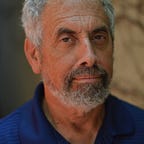“CASTAWAY” — Covid-19 and the Need for Connection
By Joseph P. Charney
Like so many, I’m trying to find the quality movies I’ve missed over the years. That goal led me to Tom Hanks’ “Castaway”, a film released 20 years ago. I want to believe I was meant to see it at this particular time — a time when I could best receive its profound message.
Tom Hanks portrays “Chuck Noland”, an average guy who finds himself “castaway” on a small uninhabited island in the middle of the ocean. We witness him dealing with the immediate shock and fright from being the only survivor of a plane crash. I thought we would learn about his thoughts by hearing him talk to himself. I was wrong. He finds “someone” to speak with — because he desperately needs someone to speak with. So he creates “Wilson”, using a volleyball taken from one of the packages that rolled on the island with him. He uses his own blood to paint a face on Wilson. This is the beginning of a friendship. The film fades and we are told that four years have past.
We now see Hanks’ character as more gaunt, his hair wild, looking like someone out of the stone age. He has acquired skill sets, like fishing, that has allowed him to survive for those years. When we hear him speak, he is speaking to Wilson. It becomes obvious he needs his companion emotionally, and takes him wherever he goes, including on the raft he will eventually use to attempt to escape the island.
It is particularly poignant to watch “Castaway” today and witness the portrayal of human isolation and the impact it has on an individual. For months now, such isolation has been a pall on us all, especially for the elderly separated for our own safety. We are told to “distance”. We must hide from each other with masks and we must make as little contact as possible. “Castaway” is a dramatic reminder of the impact of isolation — how we humans are not meant to be isolated. How we will do anything to interact with our own kind, to the point of projecting life on the inanimate — on the ridiculous.
When we watch Chuck, we don’t see him growing insane. Rather, he is doing everything he can to remain sane. He is doing everything he can to stay human. And to stay human he must find another conscious life that he can connect with. In the absence of that he must practice his humanity with a simulated life - in this case, Wilson. Chuck treasures that connection, to the point that he risks his own life to retain it, and in one of the most poignant scenes of the movie, breaks down when he can’t retrieve Wilson as the volleyball floats far from his raft. He suffers the same grief as one would after losing a close friend. And we understand.
Living in the time of this isolating pandemic, “Castaway” is a warning. It warns us to remember the impact we and others are feeling with the loss of connection. It puts a mirror in front of us about the importance of human contact and that sacrificing it creates costs that we may not even contemplate. For some, the loss of this contact can lead to self-destructive thoughts or actions, such as that portrayed by Chuck’s failed suicide attempt.
Isolation is itself a health danger, and one that must be seriously considered when deciding how to move forward and better manage these times.
